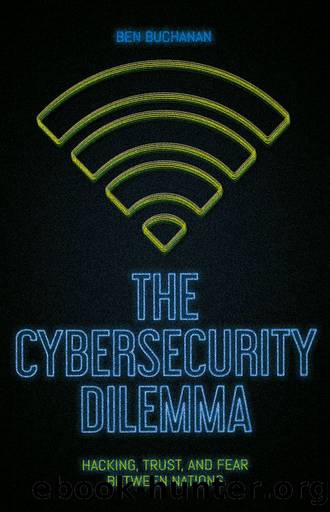The Cybersecurity Dilemma by Ben Buchanan

Author:Ben Buchanan
Language: eng
Format: epub
Publisher: Oxford University Press
Published: 2016-08-15T00:00:00+00:00
Objection: Cyber Capabilities are Unevenly Distributed
The third objection acknowledges most of the cybersecurity dilemma argument. According to this objection, while some intrusions are of great value for defensive purposes and can also be threatening, the overall conclusion that the cybersecurity dilemma can be destabilizing is simply irrelevant. This is because cyber capabilities are unevenly distributed. States without advanced capabilities will always fear states with them, regardless of any particular intrusion. States with advanced capabilities will also be better able to absorb the blow of a surprise attack from a weak state and still respond. Stated more formally, the uneven distribution objection might read: A security dilemma is most acute when new evidence increases the apparent plausibility of merely possible threats. In cybersecurity, because of the uneven distribution of capabilities, threats are either obviously plausible (as occurs when weak states fear comparatively stronger ones) or barely possible (as occurs when strong states fear weak ones). Therefore, regardless of a state’s capabilities, the dilemma of interpretation arising from a detected intrusion does not appreciably change a state’s overall fears.
To some degree, this objection appears to make initial sense. States with no cyber capabilities are likely to recognize that they are at a disadvantage relative to states that do have great capabilities. Regardless of whether they detect an intrusion, they are likely to feel threatened, since they know their own weakness and can assume that others might have a general idea of it. Similarly, strong states will in general have less reason to launch defensive-minded intrusions into manifestly weak states, as they have less to gain. They will likely be able to use baseline defenses to secure their networks against the weak state’s capabilities.
A very significant exception is if the strong state is looking for malicious code from other states that have also intruded into the same important network of the weak state. This is a third-party Counter-Computer Network Exploitation effort. In general, however, the case of an intrusion into a weak state’s network is less likely to be narrowly defensive-minded and presents much less ambiguity. While the threat to the weak state from strong states is still real, without a dilemma of interpretation the cybersecurity dilemma logic makes little difference when it comes to very strong and very weak states.
That this objection is true to some degree, however, does not render it terribly potent. A similar objection can be made about the security dilemma more generally: states with manifestly weak kinetic forces will always fear the kinetic forces of strong states, in the absence of deeply credible reassurances. Yet, despite this, the security dilemma logic remains a central and valued part of much international relations scholarship and practice. This is largely because conflict is most interesting and geopolitically destabilizing when it does not involve a very strong state against a very weak one, but instead when it involves two states of more equal clout. Given this idea, one can stipulate that both the security dilemma and the cybersecurity dilemma are of comparatively
Download
This site does not store any files on its server. We only index and link to content provided by other sites. Please contact the content providers to delete copyright contents if any and email us, we'll remove relevant links or contents immediately.
| Arms Control | Diplomacy |
| Security | Trades & Tariffs |
| Treaties | African |
| Asian | Australian & Oceanian |
| Canadian | Caribbean & Latin American |
| European | Middle Eastern |
| Russian & Former Soviet Union |
The Secret History by Donna Tartt(16611)
The Social Justice Warrior Handbook by Lisa De Pasquale(11486)
Thirteen Reasons Why by Jay Asher(7783)
This Is How You Lose Her by Junot Diaz(5755)
Weapons of Math Destruction by Cathy O'Neil(5032)
Zero to One by Peter Thiel(4818)
The Myth of the Strong Leader by Archie Brown(4787)
Promise Me, Dad by Joe Biden(4441)
Stone's Rules by Roger Stone(4413)
Beartown by Fredrik Backman(4406)
How Democracies Die by Steven Levitsky & Daniel Ziblatt(4393)
The Fire Next Time by James Baldwin(4338)
100 Deadly Skills by Clint Emerson(4072)
A Higher Loyalty: Truth, Lies, and Leadership by James Comey(4028)
Rise and Kill First by Ronen Bergman(4009)
The David Icke Guide to the Global Conspiracy (and how to end it) by David Icke(3876)
The Farm by Tom Rob Smith(3870)
Secrecy World by Jake Bernstein(3774)
The Doomsday Machine by Daniel Ellsberg(3726)
